Commercial property records
How to best access property records for multifamily, land, and commercial properties anywhere in the U.S.

Throughout this page, we’ll take a deep-dive into property records of all kinds. We’ll cover the following types:
Property Records Search by Address or Owner
Property Sales Records
Property Owner Records
Mortgage Records
Building and Lot Records
Tenant Records
Property Tax Records
Property Records by Property Type
Property Records by State
Property Records by County
Using the Reonomy web app as our basis, we’ll examine the best ways to access property sales records, owner records, mortgage records, building records, tenant records, and much more for multifamily, land, and commercial properties of any kind, in any market nationwide.
Property Records
Property Records have long been a source of valuable information and insights for the commercial real estate industry. They’ve also been, however, a long-time source of headaches for those trying to access them. The industry has become more widespread and remote over time, but has suffered from outdated processes that disallow the ability to efficiently access property records.
That is all changing, however. Instead of wasting time trying to find records through public sources, Reonomy does the dirty work for you, bringing various types of property and people-based records together on one platform for you to promptly gain the insights you need. With all of that said, let’s get into the details. First up, we’ll look at common property records searches.
Property Records Search
When searching for multifamily, land, or commercial property records in any U.S. county, the most common way that people search is to lookup a property that they’re already familiar with. This is usually done by using a property address or an owner’s name. Unlike public records searches that shine a light on specific deeds and documents, however, Reonomy brings all property records on a single asset into one place, accessed through searching a single address, name, or LLC.
Property Records Lookup by Address
You can type a property address directly into the search bar at the top of the page. And unlike many public records search portals, Reonomy allows for some leeway in how an address is entered. For example, you could enter, “9th Ave,” “Ninth Ave,” or “Ninth Avenue,” into the search bar (of course followed by a city and state), and you’ll be taken to the same property, regardless of the actual recorded address of the property. In fact, by the time you’ve entered a few letters, the dropdown box in the search will have already populated addresses that match what you’ve typed.
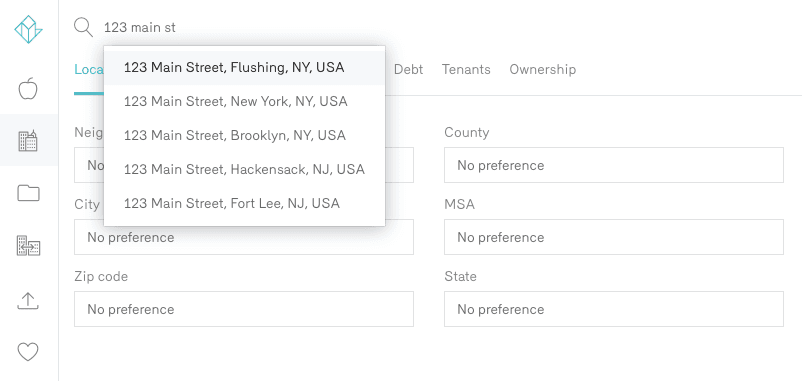
Upon either clicking one of the dropdown selections or pressing “enter” on your keyboard, you’ll be taken to the profile page of the parcel that sits at the address you’ve entered. Here, you can find building and lot information like the size of the building and lot, the age of the building, its metropolitan statistical area (MSA), whether it sits in an Opportunity Zone, and much more. You’ll also be able to see the property’s owner records, sales records, mortgage records, as well as tax valuations and who the current tenants are, all of which we cover in more detail below:
Property Records Lookup by Owner
The other common way to lookup known properties is by the name of the owner. This is usually done by those who are trying to dive further into an owner’s portfolio or an individual property to find specific deeds or notes. They might be doing something as simple as trying to find the APN of a property, or as broad as an attempt to service an owner’s entire portfolio, and thus learn as much about it as possible. In Reonomy’s search platform, within the Ownership tab, you have the ability to search by the owner of record or by an individual’s name—meaning you can either search for an LLC or a person.
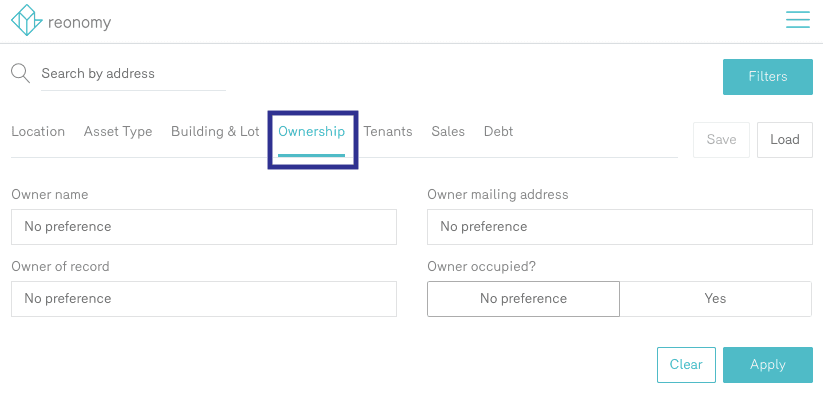
You can also search for properties based on the owner’s mailing address (if known), in case you are looking to find multiple properties tied to an owner and would like to avoid the noise of a common name. If you prefer, there is also an option to search only for properties that are owner-occupied, in case you’re looking for properties where the owner is also a tenant, or only properties where the owner is not a tenant. From there, once you’ve run your search, you’ll be given a list of properties that have the name you’ve searched as an associated owner.
As mentioned above, you can click into individual property profiles, where you can scan the property’s sales, debt, tenant, and building records (which, again, we’ll cover individually below).
Property Sales Records
Sales History
Comprehensive property sales records on Reonomy will show the sales history of any commercial asset, the parties involved in each transaction, the sale price, the date of sale, the document number and type, and much more.
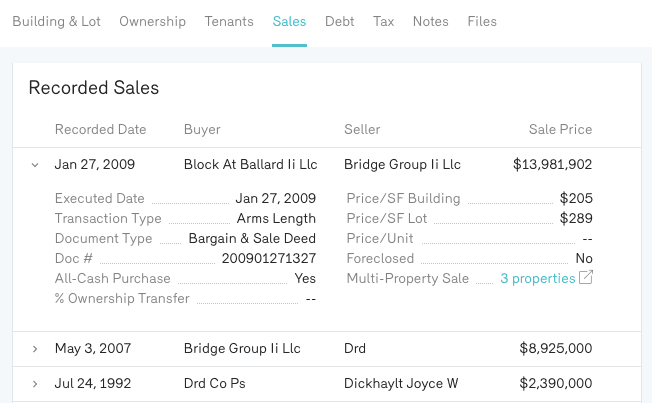
FIND POTENTIAL PROPERTIES TO LIST
Looking at a property’s sales history lets you see how long the current owner has held the property. The average holding period of a commercial asset is 10 years. If there has not been a sale within the last 10 years, it can serve as an indicator that there is a higher likelihood that a property will sell. You can see all of this in Reonomy, and if you’d prefer, you can even search for properties based on their most recent sales date.
FIND RECENTLY SOLD PROPERTIES (I.E. NEW PROPERTY OWNERS)
Service providers looking for properties to prospect often target new owners. This is because new owners are often motivated to make improvements on a newly purchased property, and the owner is much less likely to have service providers already employed. Likewise, a change in ownership/management usually presents a change in existing building contracts. So, in looking at property sales records to see assets that have recently sold, you can find owners that are likely in need of some kind of property or building servicing.
FIND POTENTIAL BUYERS
For one, sales records show recent sellers that have cash on-hand and are potentially looking to reinvest in new assets (similar to the one they’ve just sold). Searching recent sellers on Reonomy is one way to build a list of potential real estate buyers. You can also use comps (discussed below) to search for properties that are similar to the one you’re trying to sell. By doing this, you can find owners who have recently purchased similar properties, that may be looking to add more assets to their portfolio.
UNCOVER ABNORMAL TRANSACTIONS
If a property has transacted several times in a short period of time, or if there is an abnormal number of sales, red flags arise. These red flags could prompt further questions or due diligence that might help you uncover information that would cause you to avoid pursuing a property.
Property Values
Analyzing the previous sales price and date can serve as a proxy to determine what the current value of a property is as well. The most recent sales price can be appreciated or depreciated by the change in overall market value to get a rough idea of what the current value is. You can also combine the sales history of a property with other similar properties (otherwise known as comparables or “comps”) that have sold more recently to better gauge its current value.
SALES COMPS
Property sales records, while not the only factor, are the basis of all comps for commercial real estate. Comps are a critical part of estimating the current value of a commercial asset, and are popular among appraisers and investors. On Reonomy, you can easily find comps for any property. They are created using prices paid for recently sold properties similar in size and characteristics, that are under similar environmental and locational influences.
Property Owner Records
Recorded Owner Name and Details
With property sales records, you can see the LLCs historically involved with transacting an asset. Property owner records, however, show you more in-depth details associated with current owner. First and foremost, Reonomy owner records show you the current recorded owner of a property, LLC or individual, along with the contact information of the individuals associated with ownership in any way (including those behind an owning-LLC).
Property Owner Contact Information
Reonomy gives access to property owner phone numbers, email, and mailing addresses, letting you go beyond the name of the LLC and get the contact info for LLC decision-makers. In the Ownership tab of any property profile page, you can see all of this in one place.
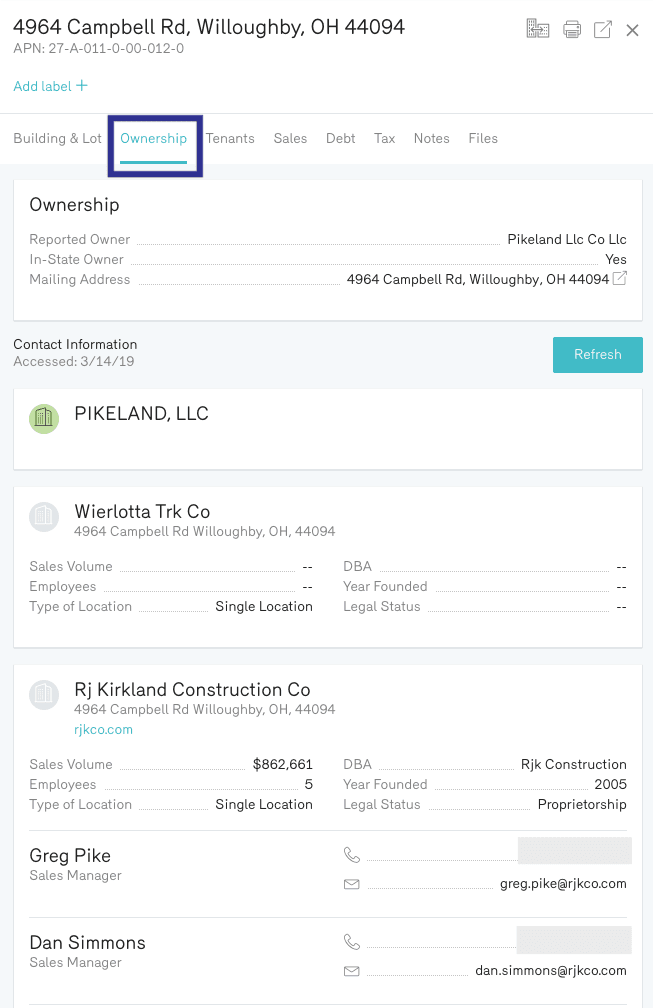
Contacting the current owner
In order to be involved in the servicing or the transaction of a property, at some point you’ll need to contact the decision maker—the owner. Or at least that is the best-case scenario. Reonomy’s comprehensive property owner records go beyond the reported owning entity (LLC) to give you the actual people that own the property, with a variety of ways to reach those owners (via phone number, mailing address, and email). Owner records with accurate contact information save significant amounts of time for CRE professionals.
They save the time usually needed to find contact information, plus allow you to waste less time with incorrect contact details. Time is also saved by minimizing the amount of people involved in any transaction or interaction. You can go through fewer chains of command and are more likely to generate an answer in a timely manner. Property owner records are also extremely helpful for a number of other reasons.
Understanding the intent of the current owner
Ownership records paired with sales and mortgage records help when trying to understand the current owner’s motivations and intent. An owner search will show how long the current owner has held the property for and what they paid for the property. Both of these will help when making an inference on what the owner intends to do with the property. The longer someone has held a property, the more likely they are to sell. The price the owner paid for the property can suggest what they expect to receive for the property now.
The intent of an owner looking to sell can be further analyzed, as well. If an owner has owned the property for a short period and is looking to sell, they may value the speed of sale. Understanding the intent of the owner is also valuable when making contact, because it allows you to tailor your pitch on a very granular level. It lets you find a scenario whereby meeting their needs can also benefit your own.
Mortgage Records
Property mortgage records outline the current and past debt on a commercial asset. On Reonomy, that includes the following information…
Mortgage Origination and Maturity Dates
The mortgage origination date is the date that a loan was issued. You can see the origination date of individual loans when analyzing a property in Reonomy. You can also see the maturity date of the loan—the date in which the loan is set to be repaid in full. This is also the termination date of a mortgage. The maturity date is perhaps the most valuable indicator of opportunity for mortgage brokers and lenders.
Loan Amount
The loan amount is the value or size of the mortgage when first issued. Within the mortgage records of a property, you can see the exact loan amount, as well as the terms of the loan.
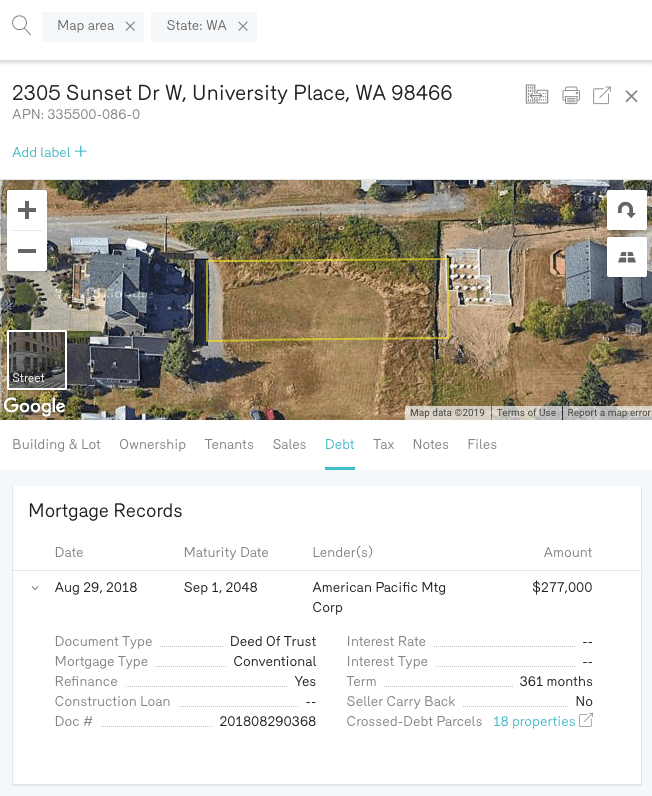
Lenders
Reonomy also lets you see the issuer of a property’s most recent loan. Paired with the above information, you can infer quite a bit about a property, its owner, and its lender.
Search for loans of a specific lender
You can search in Reonomy for specific lenders to see all of the properties where they are the most recent supplier of a loan. You can further filter such a search by location, asset type, building and lot characteristics, and much more. By analyzing a lender’s full portfolio, you can gain a lot of context into how your competitors operate, and to see the type of properties that they usually target.
Find refinance leads
By looking at loans that have originated 5-7 years from today (the typical holding period for a commercial asset), you can spot properties and owners that are likely looking to refinance and build a list of loan leads. Furthermore, if you are a lender, by seeing the loan amount and current lender, you can get a better feel for how you will line up with the owner, and how you stack up against your competitors. For example, if you know that you can offer better interest rates than that of the current lender, your pitch has already hit the ground running. You can identify properties in bulk by running a debt-based filtered search in Reonomy. If you’d like, you can even export your list of results.
Pre-Foreclosure Records
Another unique part of Reonomy’s debt records is the ability to see if a property is currently in pre-foreclosure. This includes what category of pre-foreclosure the property is in, its current status, the recording date, judgment amount, and more.
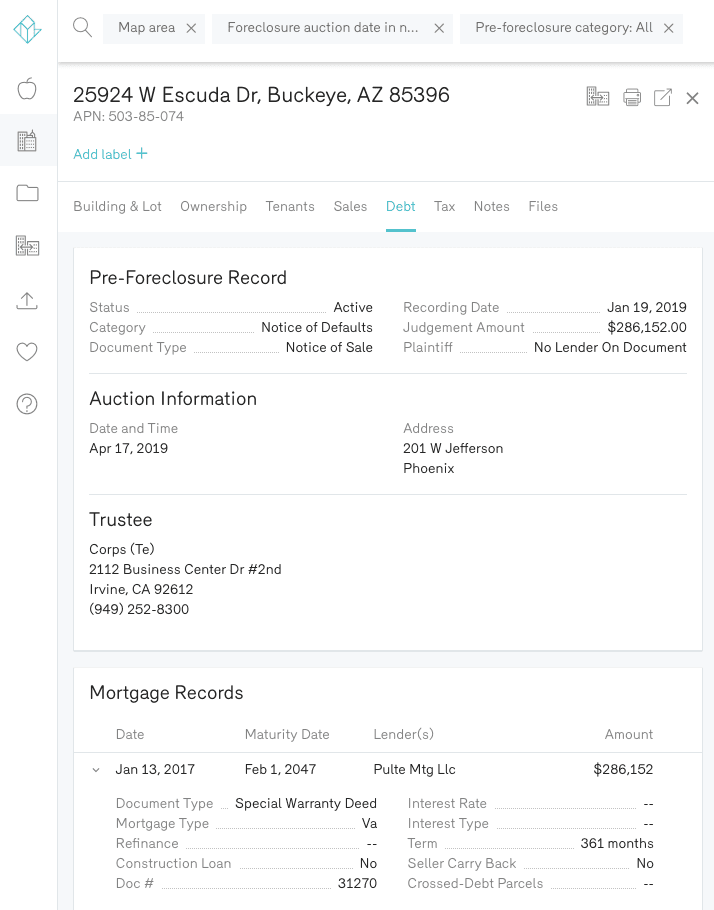
This can help in building a list of leads, in the case that you are a lender of distressed properties. It can also help for investors and other buyers that are looking to capitalize on pre-foreclosure investing before properties reach auction.
Building Records
Building and lot records include the full specs of the lot size, as well as the size and age of the building that sits atop the lot. All of the building records available on Reonomy allow you to analyze the physical layout of any property to determine its relative value to you.
Building and Lot Size
When analyzing building records on Reonomy, you can see the measurements associated with any multifamily, land, or commercial property. See the building area and year built, lot area, number of units, and more.
Zoning
You can also see certain lot delegations, such as the zoning of the parcel, the census tract number of that parcel, as well as if it does or does not sit within a Qualified Opportunity Zone.
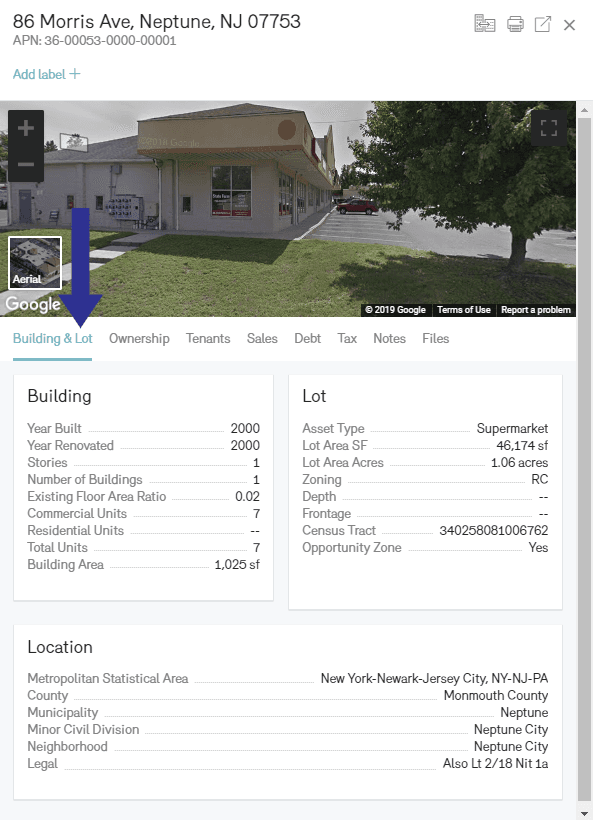
Opportunity Zone Properties
In this section, you can gauge the potential return on investment through seeing whether or not the asset is within a Qualified Opportunity Zone. From there, you can analyze the transaction and debt history of the property, its owner, and its tenants, to build a hyper-targeted pitch and reach out directly with owner contact information.
Tenant Records
Tenant Name
On top of the people that own the property, Reonomy also lets you see the people who are currently tenants in the building. When looking at the profile of any commercial property (retail, industrial, office, etc.), you can see all of the current tenants in the building by the name of their business. You can also see the name(s) of tenant contacts, along with their phone number and relative position.
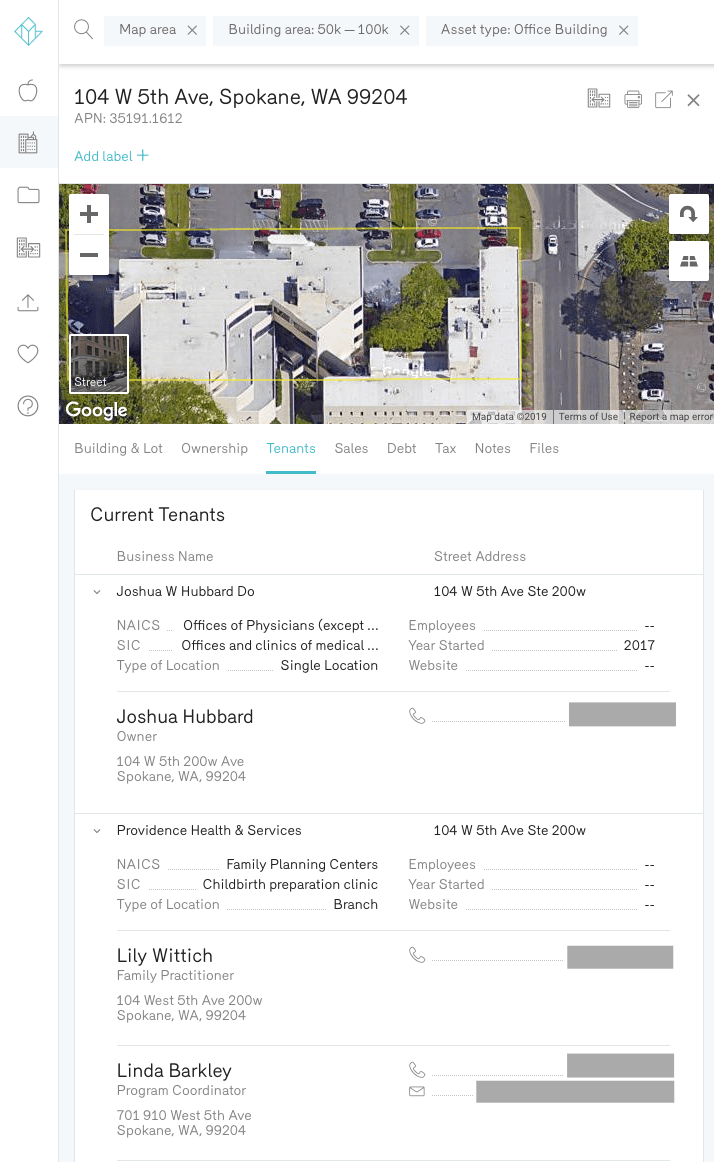
Tenant Business Type
Furthermore, on top of the business name, Reonomy tenant records include the NAICS and SIC code identifications of the tenant—in other words, the business type of the tenant. Records also include whether the business is a branch or single location, the year the business was started, the website of the business (if available), and more. Both tenant names and business types can be searched as well in Reonomy to specifically identify business properties of a certain kind.
Property Tax Records
Property tax records outline the annual tax rate, annual tax commitments, and the property’s assessed and market values. For investors looking to calculate the NOI or cap rate of a property, the annual tax commitment is a significant expense that needs to be known in order to calculate. A property’s assessed value can aid in estimating the current value of a property.
Property Records by Property Type
Finding property records for different property types can sometimes be a bit of a struggle. When it comes to public records sources, there isn’t always going to be one overarching way to find information on every property type—unless you use Reonomy. Tailor your commercial property records search to the asset class and sub-class of your focus. Common property type records searches include multifamily, retail and industrial. That is only a small portion of what is available to search in Reonomy, however.
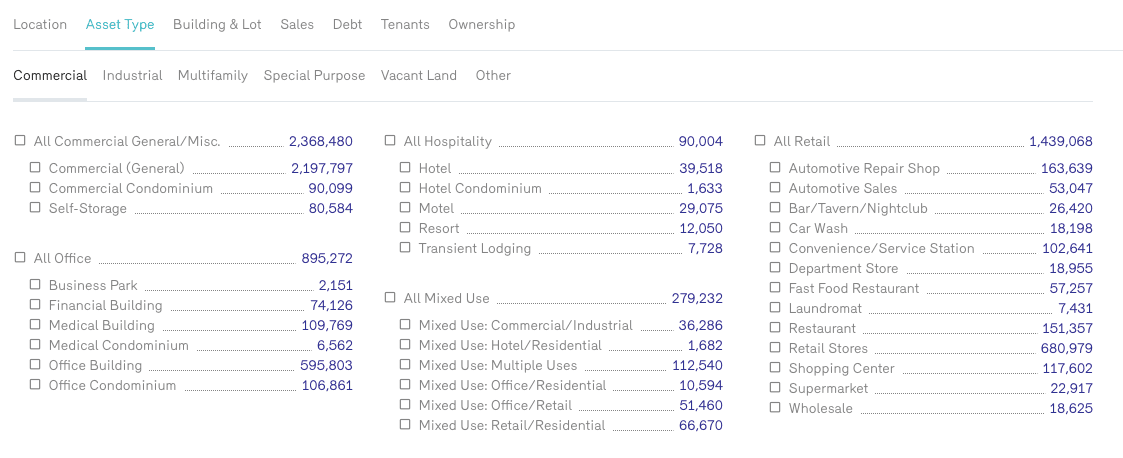
Increase granularity by searching via sub-classes. Refine a multi-family property type search by choosing sub-categories such as apartment buildings (5+units), duplexes or mobile home parks.
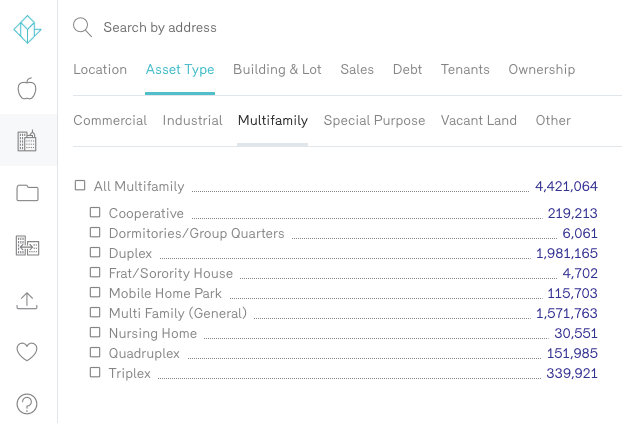
You can use Reonomy to find property records on the entire supply of commercial properties nationwide. All-in-all you can find property records on the following asset classes:
Multifamily Homes
Apartment Buildings
Duplex/Triplex
All Industrial
Warehouses
Retail Space
Office Buildings
Mixed-Use
Hotels
Healthcare Properties
Mobile Home Parks
Self-Storage
Land
Farms
and many more…
Property Records by State
You can also tailor your property records search to the geographies or states of your focus.
California Property Records
Search 2,955,630 commercial property records in California.
Find Californian multifamily property records by searching 647,690 multifamily properties. Search 81,641 offices for office owners and find retail building owners from 165,832 Californian retail stores.
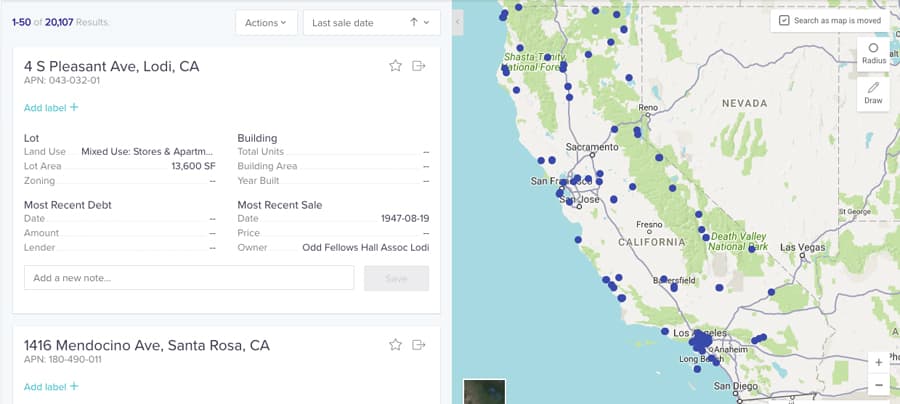
Texas Property Records
Search 4,283,704 commercial properties in Texas to find property owners in any market in the state—Harris County, for example. Refine Texas property owner searches further by asset type, recency of purchase and property owner debt.
Learn a bit more about searching Harris County records here.
Find Texan multifamily property records by searching 142,203 multifamily properties. Search 2,077,632 Texan land parcels for landowners and find agricultural landowners from 1,231,245 Texan agricultural properties.
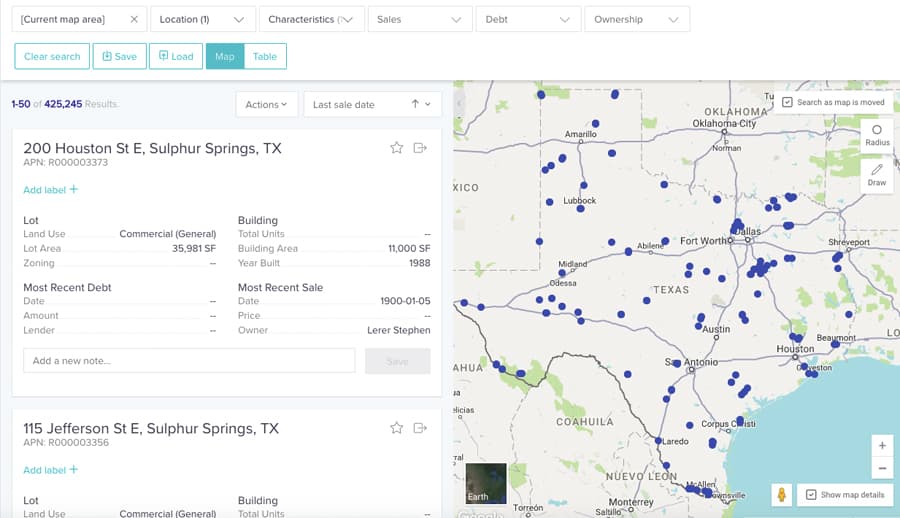
New York State Property Records
Search 2,046,478 commercial properties in New York to find property owners. Refine New York property owner searches further by asset type, recency of purchase and property owner debt.
Find New York multifamily property owners by searching 763,306 multifamily properties. Search 707,487 New York vacant land parcels for landowners and industrial property owners by searching 52,485 industrial properties and facilities.
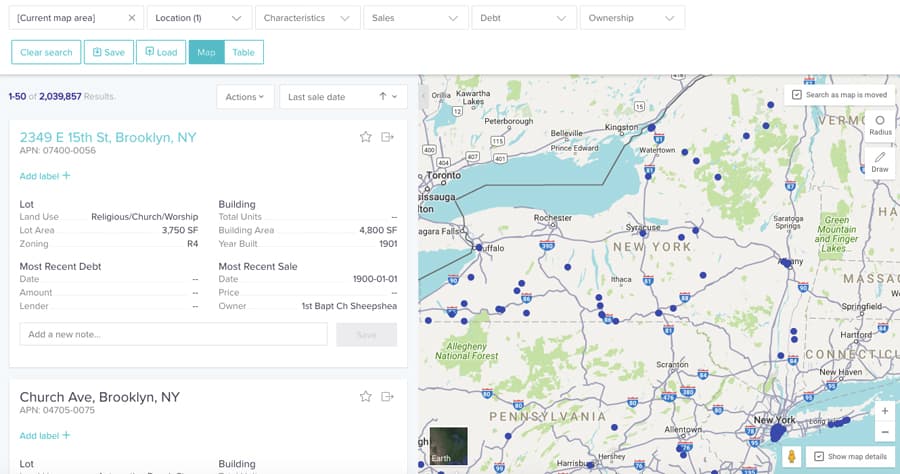
Property Records by County
Another popular way for CRE professionals to delve into property records is to search within their municipality of focus, or by county.
Los Angeles County Property Records
Find commercial property records in Los Angeles County, search 605,529 commercial properties to find owners in Los Angeles.
Find multifamily property records in Los Angeles County, search 252,487 Los Angeles multifamily properties to find owners.
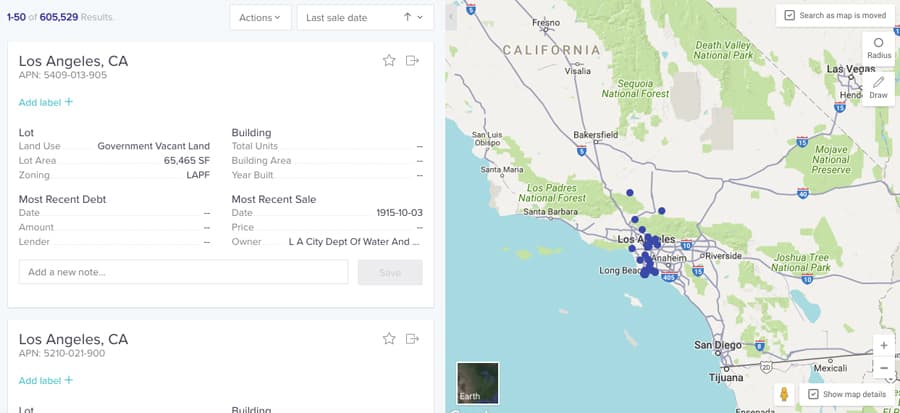
Harris County Property Records
Find commercial property records in the Houston area, search 283,362 commercial properties to find owners in Harris County.
Find multifamily property records within Harris County, search 6,522 Harris County multifamily properties to find owners.
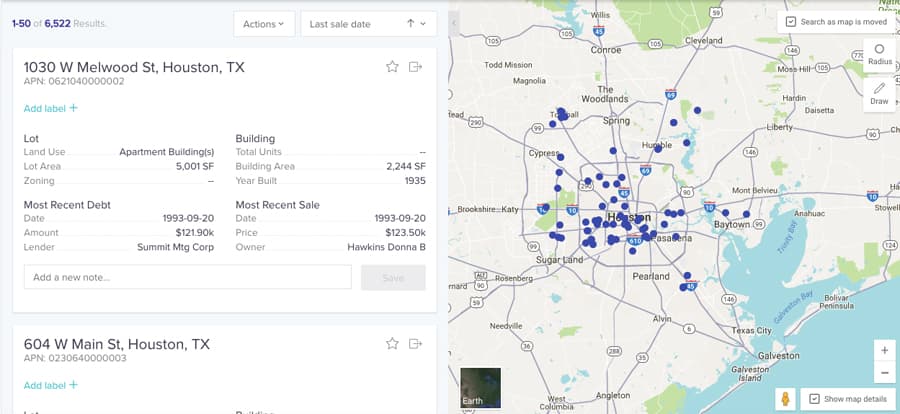
San Diego County Property Records
Find commercial property records in the San Diego area, search 117,794 commercial properties to find owners in San Diego County.
Find multifamily property records within San Diego County, search 44,488 San Diego County multifamily properties to find owners.
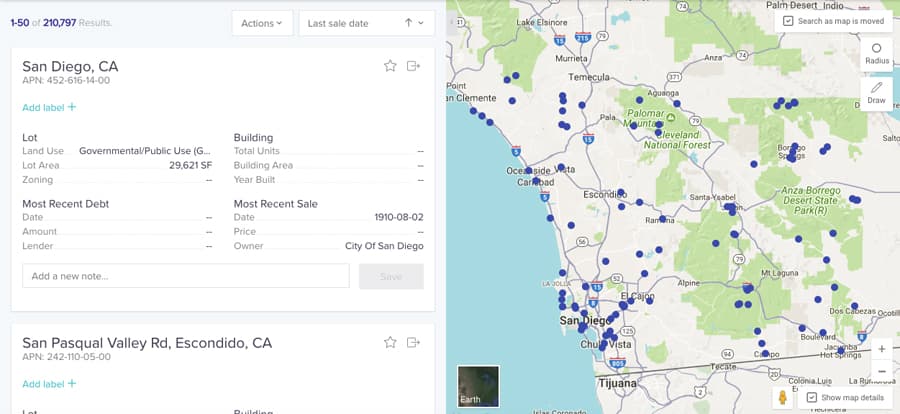
You can go well beyond searching by state or county, and search within specific zip codes, neighborhoods, and even by street name. While public property records are often spotty and specific to a county, or at best, specific to a single state. With Reonomy, you can find in-depth property and owner records in any market nationwide, with full access to the entire country at your fingertips.
Author

Reonomy
Resources team
Author

Reonomy
Resources team



